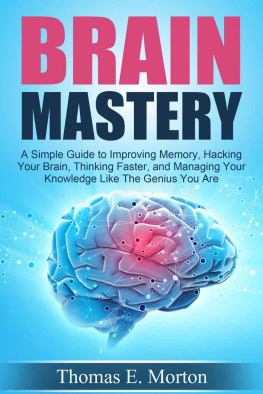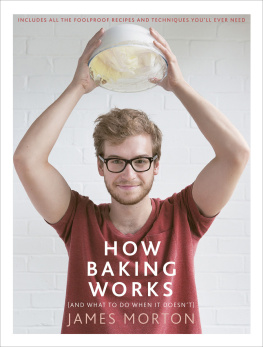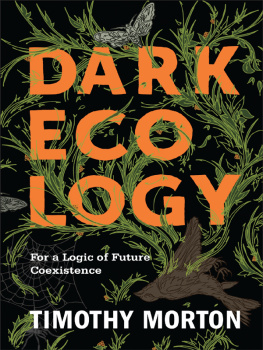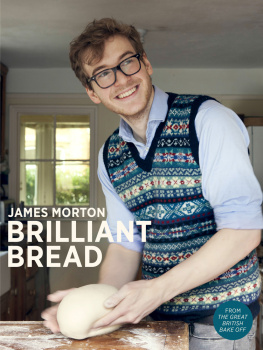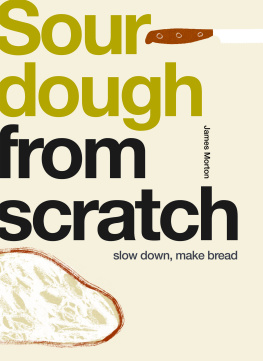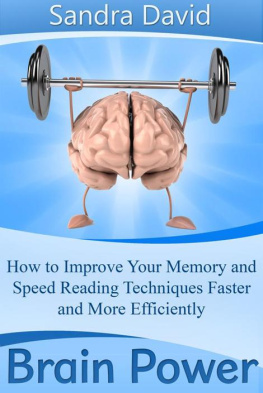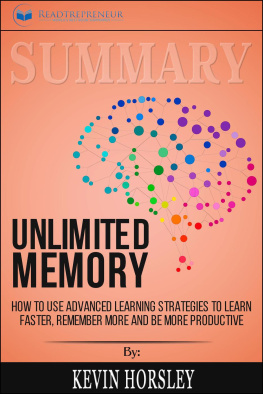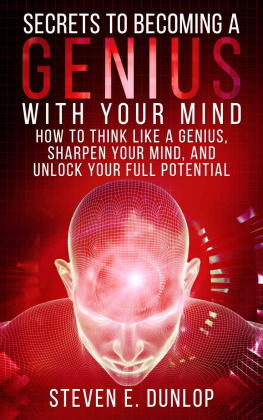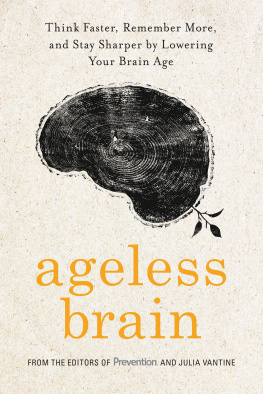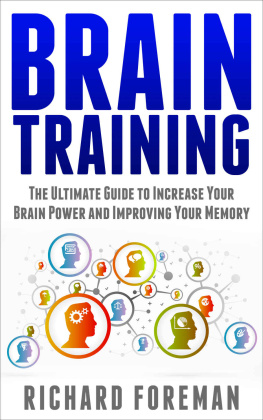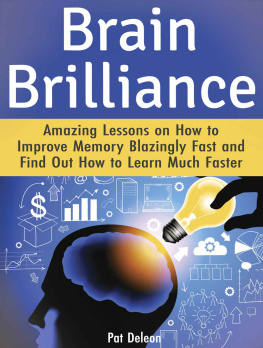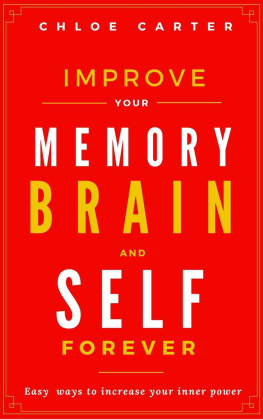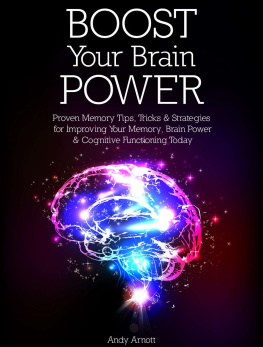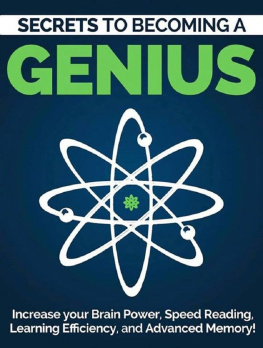Morton - Brain Mastery: A Simple Guide to Improving Memory, Hacking Your Brain, Thinking Faster, and Managing Your Knowledge Like The Genius You Are
Here you can read online Morton - Brain Mastery: A Simple Guide to Improving Memory, Hacking Your Brain, Thinking Faster, and Managing Your Knowledge Like The Genius You Are full text of the book (entire story) in english for free. Download pdf and epub, get meaning, cover and reviews about this ebook. year: 2014, genre: Home and family. Description of the work, (preface) as well as reviews are available. Best literature library LitArk.com created for fans of good reading and offers a wide selection of genres:
Romance novel
Science fiction
Adventure
Detective
Science
History
Home and family
Prose
Art
Politics
Computer
Non-fiction
Religion
Business
Children
Humor
Choose a favorite category and find really read worthwhile books. Enjoy immersion in the world of imagination, feel the emotions of the characters or learn something new for yourself, make an fascinating discovery.
- Book:Brain Mastery: A Simple Guide to Improving Memory, Hacking Your Brain, Thinking Faster, and Managing Your Knowledge Like The Genius You Are
- Author:
- Genre:
- Year:2014
- Rating:3 / 5
- Favourites:Add to favourites
- Your mark:
- 60
- 1
- 2
- 3
- 4
- 5
Brain Mastery: A Simple Guide to Improving Memory, Hacking Your Brain, Thinking Faster, and Managing Your Knowledge Like The Genius You Are: summary, description and annotation
We offer to read an annotation, description, summary or preface (depends on what the author of the book "Brain Mastery: A Simple Guide to Improving Memory, Hacking Your Brain, Thinking Faster, and Managing Your Knowledge Like The Genius You Are" wrote himself). If you haven't found the necessary information about the book — write in the comments, we will try to find it.
Brain Mastery: A Simple Guide to Improving Memory, Hacking Your Brain, Thinking Faster, and Managing Your Knowledge Like The Genius You Are — read online for free the complete book (whole text) full work
Below is the text of the book, divided by pages. System saving the place of the last page read, allows you to conveniently read the book "Brain Mastery: A Simple Guide to Improving Memory, Hacking Your Brain, Thinking Faster, and Managing Your Knowledge Like The Genius You Are" online for free, without having to search again every time where you left off. Put a bookmark, and you can go to the page where you finished reading at any time.
Font size:
Interval:
Bookmark:
Your Free Bonuses
I want to say ThankYou for buying my book so I wanted to give you access to
The Mental Mastery Toolkit
The Toolkit containsawesome mental freebies, free books from the series, and is updated monthly.
The Mental Mastery Toolkit
Visit the Link Above to get access to it now!
Thanks, Thomas
Check Out The OtherBooks From The
The Mental Mastery Series
Contents
Your Free Bonuses
I want to say ThankYou for buying my book so I wanted to give you access to
The Mental Mastery Toolkit
The Toolkit containsawesome mental freebies, free books from the series, and is updated monthly.
The Mental MasteryToolkit
Visit the Link Above to get access to it now!
Thanks, Thomas
Check Out The OtherBooks From The
The Mental Mastery Series
Weall have trouble remembering things every now and then. But if you, likethousands of other people, find that you cant seem to remember much ofanythingeven important informationyou may need to work on retraining yourbrain. Luckily, you have come to the right place!
Ourmemories are vital to our lives. Without long term memories, we have no way ofknowing what has happened in our pasts. We may forget the faces of our familymembers, the voices of our children, or the moments that have shaped who we arethroughout the years. Weddings, birthdays, anniversaries, holidays, andrelatives who have passed on all reside in our long term memories. However,the long term memory is not just responsible for nostalgia; it also storesinformation on our hobbies, interests, spoken languages, skills, abilities, andstudies. Without these memories, we would simply not be able to be who we are.
Andour short term memories are just as important, although much differently so. Short term memories store brief information. This is how we lean new things,experience new tastes, and understand new information. It is the job of theshort term memory to determine what is important, and to make associations thatcan help store that information in the long term memory. If the short termmemory suffers, we can no longer learn anything new. It would be completelyimpossible to ever change. So, if the long term memory is what keeps theinformation from our pasts, then the short term memory is what allows us togather new information for the future. And both are equally important!
Unfortunately,memory loss can happen to anyone. Many people the world over suffer from someform of memory loss. Those who are lucky only forget certain bits and piecesof the long term memory, and may still be able to access those pieces ofinformation with the right kind of training and mental cues. Others may forgetlarge chunks of long term memory, but still retain skills and abilities. Andsadly, there are some who suffer from illness and injury and are no longer ableto form new memories or call upon old ones. Over time, with diseases such asAlzheimers, the lack of memory access can lead to death, when the body nolonger recalls how to eat or breathe on its own. These are very real, and verysevere, consequences to having a damaged memory.
Butsince you are reading this book, you are already on the right track torepairing any damage your memory may have suffered over time. This is notsomething that can happen overnight, however. It takes real effort to work toregain the lost memory capacity of your younger days. But the payoff is verymuch worth it.
Intodays world, it is even more difficult to concentrate and remember than itused to be. We have information thrown at us left and right, all the time, inloud noises and bright, flashing colors that make it hard even to focus on whatwere hearing or seeing in the first place, much less internalize it in anyway. Television, movies, music, and the Internet all make sure that werelooking everywhere all the time, with almost no opportunity to calm down andconcentrate on any given subject matter. This is a big problem for those whohave memory troubleand for those who would like to keep from having memorytrouble, too!
Thatis why the first step toward improving your memory is to simply stop, take adeep breath, and relax. You must learn to ignore the flashy information andentertainment that surrounds you every day. You must be willing to turn offthe television, turn off the computer, and really take some time to get back intouch with your mind, body, and spirit. Without this vital act, you will neverbe able to thoroughly work on your memory at all. But never fear! It isnthard to separate yourself temporarily from these distractions. All it takes isa little willpower to say that for an hour (or however long you have to devoteyourself to your brain) every day, you will not be drawn in to that world ofwhizzing and whirling information, and instead you will sit down with somethingthat you can still make heads or tails of. Whether this is a puzzle, a book,or some other form of brain training, this step is crucial!
Thisis because the best way to keep your brain healthy is to give it plenty ofexercise. Like your body, your brain needs to be treated with respect andprovided opportunities to work out. Dont skimp out on this! Your brain needsexercise every single day. Even if you can only do one sudoku puzzle a day,read one chapter per day in a book, make a couple of chess moves in one day, ortake notes on one documentary, you are doing something more than simply lettingyour brain turn to mashed potatoes. And it will thank you for the time youhave invested in it, tenfold!
Thisbook will provide you with all the strategies you need to keep your brain ingood working order. Once you read through this book, you will be able toretain all the information you could ever want! You will be able to read thenewspaper or a book and talk about the information it contained with otherpeople later. You will pass exams much more easily, learn languages quickly,succeed in public speaking without ever having to check your notes, and neverforget another persons name again. You will also learn ways to access oldlong term memories that may have become buried in time. This book will alsoexplain to you the process of memory formation and the many reasons whymemories get lost in the first place.
However,the strategies in this book can only work if you give them the chance to! Although it may seem difficult right now, you must concentrate and read throughthe entire book. And concentration is not going to come easy, if you arefacing memory problems. Take your time and go slowly through the knowledgeprovided here. Read it aloud if it helps you understand better. When you cometo sections labeled exercise your brain! be sure to answer the questions tothe best of your ability.
Theknowledge and brain training provided in this book will help you get started onthe road to memory recovery and brain health.
Thereare three types of memories that work together to process information and storeit in your brain, which leads to memorization and successful retention ofknowledge and skills. These types of memory are:
Sensory Memory
Simplyput, sensory memory relates to the senses. The five senses are sight, smell,hearing, touch, and taste. They all work to help you process information on adaily basis. When any piece of information is processed by your senses, it isstored for a brief moment in your memory. It is up to you to pay attention tothese bits of information if you want them to last for more than a second.
Whenyou hear something, it lingers in your brain for a few moments. When you seesomething, it is easy to recall what you have just seen, at least for an houror so. The further in time you get away from the situation you heard or saw,the less specific information about that situation you are able to remember.
Font size:
Interval:
Bookmark:
Similar books «Brain Mastery: A Simple Guide to Improving Memory, Hacking Your Brain, Thinking Faster, and Managing Your Knowledge Like The Genius You Are»
Look at similar books to Brain Mastery: A Simple Guide to Improving Memory, Hacking Your Brain, Thinking Faster, and Managing Your Knowledge Like The Genius You Are. We have selected literature similar in name and meaning in the hope of providing readers with more options to find new, interesting, not yet read works.
Discussion, reviews of the book Brain Mastery: A Simple Guide to Improving Memory, Hacking Your Brain, Thinking Faster, and Managing Your Knowledge Like The Genius You Are and just readers' own opinions. Leave your comments, write what you think about the work, its meaning or the main characters. Specify what exactly you liked and what you didn't like, and why you think so.

